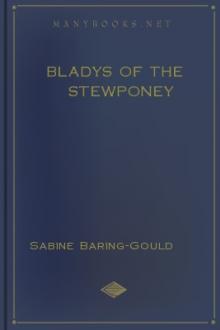The Broom-Squire - Sabine Baring-Gould (life books to read .txt) 📗

- Author: Sabine Baring-Gould
Book online «The Broom-Squire - Sabine Baring-Gould (life books to read .txt) 📗». Author Sabine Baring-Gould
"The stoat must hang on. I can't say that."
"Why not?"
"I am not obliged to give a reason."
"Will you not have me?"
"No, Bideabout, I will not. How can I take an offer made in this way? When you ask me to enable you to be rude to your sister, when you speak of me as laying traps for you; and when you stay me on my road as if you were a footpad."
Again she made an attempt to go in the direction of the hayfield. Her bosom was heaving with anger, her nostrils were quivering.
Again he arrested her.
"If you will not let me go," said she, "I will call for help. Here comes father. He shall protect me."
"I'll have you yet," said the Broom-Squire with a sneer. "If it ain't you that nets me, then it'll be I net you, Mehetabel."
CHAPTER X.
INTO THE NET.
"We must have cake and ale for the hayfield," said Mrs. Verstage. "Of ale there be plenty in the house, but for cake, I must bake. It ort to ha' been done afore. Fresh cakes goes twice as fast as stale, but blessin's on us, the weather have been that changeable I didn't know but I might put it off to anywhen."
This was said on the morrow of the occurrence just described.
Whilst Mrs. Verstage was engaged in the baking she had not time for much talk, but she asked abruptly: "What's that as to Bideabout? Father said he'd come on you and him, and you was both in a sort o' take on."
Mehetabel had no reason for reticence, and she told the hostess of the suit of the Broom-Squire, and of the manner in which he made his proposal. Mrs. Verstage said nothing at the time. She was occupied--too occupied for comments. But when the cake was in the oven, she seated herself at the kitchen table, with a sigh of relief, and beckoned to Mehetabel to do the same.
Mrs. Verstage was warm, both on account of the heat of the morning, but also because she had been hard at work. She fanned herself with a dish, and as she did so looked at the girl.
"So--the Broom-Squire offered himself, did he?"
Mehetabel made a sign in the affirmative.
"Well," continued the hostess, "if he weren't so good a customer here he would be suitable enough. But yet a good wife will soon cure him. A hudger (bachelor) does things as a married man don't allow himself."
Mehetabel looked questioningly at the landlady.
She said: "There must be good stuff in a man, or marriage won't bring it out."
"Who says there ain't good stuff in Bideabout?"
"I have never seen the glint of it."
"You don't see the iron ore as lies under the sand, but there it is, and when wanted it can be worked. I like a man to show his wust side forefront. There's many a man's character is like his wesket, red plush and flowers in front and calico in rags behind hid away under his coat."
Mehetabel was surprised, troubled. She made no response, but color drifted across her face.
"After all," pursued Mrs. Verstage, "he may ha' come here not after liquor, but drawed by you. Then you see he's been alone all these years, and scriptur' saith it ain't good for a man to be that. They goes sour and mouldy--men do if unmarried. I think you'd be fulfillin' your dooty, and actin' accordin' to the word o' God if you took him."
"I--mother! I!" The girl shrank back. "Mother, let him take some one else. I don't want him."
"But he wants you, and he don't want another. Matabel, it's all moonshine about leap year. The time never comes when the woman can ax the man. It's tother way up--and Providence made it so. Bideabout has a good bit o' land, for which he is his own landlord, he has money laid by, so folks tell. You might do worse. It's a great complerment he's paid you. You see he's well off, and you have nothin'. Men generally, nowadays, look out for wives that have a bit o' money to help buy a field, or a cow, or nothin' more than a hog. You see Bideabout's above that sort o' thing. If you can't have butter to your bread, you must put up wi' drippin."
"I'm not going to take Bideabout," said Mehetabel.
"I don't say you should. But he couldn't a took a fancy to you wi'out Providence ordainin' of it."
"And if I don't like him," threw in the girl, half angry, half in tears, "I suppose that is the doings of Providence too?"
Mrs. Verstage evaded a reply to this. She said: "I do not press you to take him. You are kindly welcome to stay on with us a bit, till you've looked about you and found another. We took you up as a babe and cared for you; but the parish allowance was stopped when you was fourteen. It shan't be said of us that bare we took you in and bare we turn you out. But marry you must. It's ordained o' nature. There's the difference atwixt a slug and a snail. The snail's got her own house to go into. A slug hasn't. When she's uncomfortable she must go underground."
The hostess was silent for awhile. Mehetabel said nothing. Her cheeks burned. She was choking.
Mrs. Verstage went on: "There was Betsy Purvis--she was a bit of a beauty, and gave herself airs. She wouldn't have Farmer James, as his legs was so long, he looked like a spider--and she wouldn't have Odger Kay, as his was too short--he looked like a dachs-dog. It came in the end she married Purvis, who had both his legs shot off in the wars, 'cos and why? she couldn't get another. She'd been too finical in choosin'."
"Are you tired of me?" gasped the girl. "Do you wish to be rid of me?"
"Not at all," answered the landlady. "It's becos we're so fond of you, father and I, that we want to see you well settled."
"And father--does he wish me to take Bideabout?"
Mrs. Verstage hesitated.
"He hasn't said that right out. You see he didn't know for certain Jonas were hoppin' about you. But he'd be tremendous pleased to have you well married."
"And you think I should be well married if I became Bideabout's wife?"
"Of course. He's a great catch for the likes of you, who belong to nobody and to no place, properly. Beggars mustn't be choosers."
Mehetabel sprang to her feet.
"It is so. I am a beggar. I am only a charity girl, nothing else."
She struck her head against the wall. "Let me beat my brains out if I am in your way. Why should I be thrown into the arms of any passer-by?
"You misjudge and misunderstand me," said Mrs. Verstage, hotly. "Because you have been with me so long, and because I love you, I want to see you settled. Because I can't give you a prince in spangles and feathers you fly out against me."
"I don't ask for a prince, only to be let alone. I am happy here, as a girl, working for you and father."
"But we shall not live forever. We are growing old, and shall have to give up. Iver may return any day, and then--"
The hostess became crimson to the temples; she knew how handsome the girl was, doubly handsome she seemed now, in her heat and agitation, and it occurred to Mrs. Verstage that Iver with his artistic appreciation of the beautiful, might also think her handsome, that the old childish fancy for each other might spring to new and to stronger life, and that he might even think of Mehetabel as a wife. That would never, never do. For Iver something better must be found than a girl without means, friends, and name.
"What then?" asked Mehetabel. "Suppose Iver do come here and keep the inn. I can go with you wherever you go, and if you become old, I can attend to you in your old age."
"You are good," said Mrs. Verstage; but although her words were gracious, her manner was chilling. "It is for us to think of you and your future, not you to consider for us. The Broom-Squire--"
"I tell you, mother, I don't like him."
"You must hear me out. You do not love him. Lawk-a-jimmeny! we can't all marry for love. You don't suppose I was in love with Simon when I took him? I was a good-looking wench in my day, and I had many admirers, and were more of tragedy-kings than Simon. But I had sense, and I took him for the sake of the Ship Inn and the farm. We have lived happy together, and if it hadn't been for that matter of Iver, there'd not ha' been a cloud between us. Love grows among married folk, like chickweed in a garden. You can't keep it out. It is thick everywhere, and is never out o' season. I don't say there ain't a ripping of it out one day--but it comes again, twice as thick on the morrow, and much good it does! I don't think I cared for Simon when I took him any more than you care for Jonas, but I took him, and we've fared well enough together." After a pause the hostess said, "Talkin' of marriage, I have a fine scheme in my head. If Iver comes back, as I trust he will, I want him to marry Polly Colpus."
"Polly Colpus, mother!"
"She's James Colpus's only child, and will come in for money. James Colpus is a wonderful thrivin' man."
"But she has a moustache."
"What of that, if she have money?"
"But--Iver--if he couldn't bear an ugly signboard to the house, will he relish an ugly figure-head to his wife within it?"
"She has gold which will gild her moustache."
"I don't know," said Mehetabel; "Iver wouldn't take the business at his father's wish, will he take a wife of his mother's providing?"
"He will know which side his bread is buttered better than some persons I could name."
"I fancy when folk look out for wives, they don't borrow their mother's eyes."
"You cross me in everything to-day," said the hostess, peevishly.
Mehetabel's tears began to flow.
Mrs. Verstage was a woman who did not need much time or much balancing to arrive at a determination, and when she had formed her resolution, she clung to it with the same tenacity as her husband did to his.
Her maternal jealousy had been roused, and the maternal instinct is the strongest that exists in the female nature. Many a woman would allow herself to be cut to bits for her child. But not only will she sacrifice herself without hesitation, but also any one else who in any way hinders the progress of her schemes for the welfare of her child. Mrs. Verstage entertained affection for the girl, an affection very real, yet not to the extent of allowing it to blind her to the true interests of her own son. She was roused to jealousy by the partiality of





Comments (0)